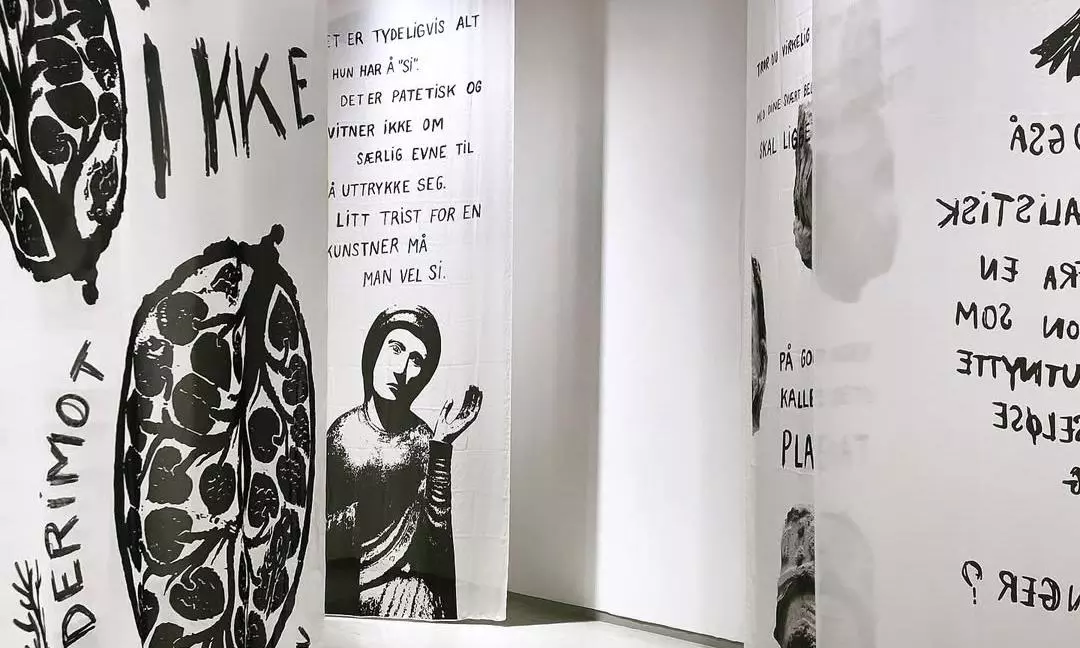
Kochi art gallery vandalism: Hanan Benammar denounces attack, defends artistic freedom
Artworks by Algerian-French artist Hanan Benammar were vandalised at Kochi’s Durbar Hall Gallery over alleged ‘abusive’ words in her exhibit

Artworks displayed by an international artist in an ongoing exhibition were allegedly vandalised at the Durbar Hall Art Gallery in Kochi by two other artists on October 22. The exhibition, Estranged Geographies, was organised by the Department of Cultural Affairs and the Kerala Lalithakala Akademi and launched on October 18.
The vandalism was carried out in protest against the alleged use of abusive language printed on the artwork.
Also Read: Indian-origin founder offers lucrative salaries to lure Meta's ousted AI talent
Go Eat Your Dad - A controversy
Seven printed lino-cut artworks titled "Go Eat Your Dad", by Algerian-French artist Hanan Benammar, based in Oslo, Norway, were reportedly vandalised by artists PH Hochimin, a Kochi-based sculptor, and his associate, Sudhamshu. They both entered the gallery around 6.30 pm, vandalised the artwork and allegedly live-streamed the act on Facebook.
According to the organisers, Benammar had printed the words that she encountered as criticism in her life and translated them into Malayalam using Google Translate, and incorporated them into her work. Those who objected to her works reportedly said that the Malayalam words that were printed alongside the artwork were abusive and inappropriate for public display.
On Thursday (October 23), Benammar expressed her concern, describing the act as an attack on artistic freedom and free expression.
Also Read: Govt proposes new IT rules for AI-generated content labelling
Artist Hanan Benammar featured her 6 lino-cut works in Kochi. Photo:Instagram/@HananBenammar
Violence on art unacceptable
Speaking to reporters, Benammar condemned the vandalism and expressed appreciation for the support she received from curators, fellow artists, and the Ministry of Culture. She said she felt relieved that no one was physically harmed during the incident, but stressed that violence in art spaces was unacceptable.
She urged that artists should think twice before attacking another artist’s work. The work that was vandalised contained strong language, and we had warned viewers who did not want to engage with it, she noted.
"I condemn any act of violence in an art space. It is very important to preserve spaces for free expression, especially in these complicated times," she said, adding that her work itself was a response to acts of silencing, moral policing, and censorship she had experienced as an artist.
Those who objected to her works reportedly said that the Malayalam words that were printed alongside the artwork were abusive and inappropriate for public display. Photo: Facebook/@Murali Cheeroth
"It was a way to release anger and reflect humorously on language, class, and gender in colloquial speech. So it is ironic to see the work attacked for the issues it explores," she said.
"We knew that the work would create discussion, and we welcome dialogue on issues of violence. I don’t want this experience to define my time here. I am very happy to be in Kerala so far," she added, reiterating that she was never contacted for discussion or criticism before this incident.
Also Read: A prized possession for generations, why Mysore silk sarees are failing to keep up with demand
Attack on artistic freedom
Kerala Lalithakala Akademi Chairman Murali Cheeroth condemned the incident, describing it as an attack on artistic freedom. "These were not abusive words. Benammar had encountered such words as criticism in her life and translated them into Malayalam using Google Translate before incorporating them into her work," he said.
He added that the Akademi would lodge a police complaint over the incident. "We discussed the issue with the executive members and decided to take legal action. Such acts must be resisted so that they are not repeated in the future," he said.
Cheeroth also said Benammar wanted the torn pieces of her artwork to remain on the gallery floor as a symbol of resistance.
Meanwhile, Hochimin told a television channel that he had no regrets about his action. "It was not art but abusive language. We have fought for freedom of expression, but this work was anti-Dalit and anti-women, which I cannot accept as an artist," he said, adding that he was ready to face the consequences if legal action was taken.
According to the organisers, the exhibition was curated by Anushka Rajendran and Damien Christinger, featured artists from France, Norway, Switzerland, and Kerala, "aiming to situate regional practices within a global context".

